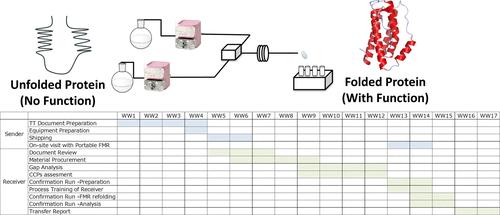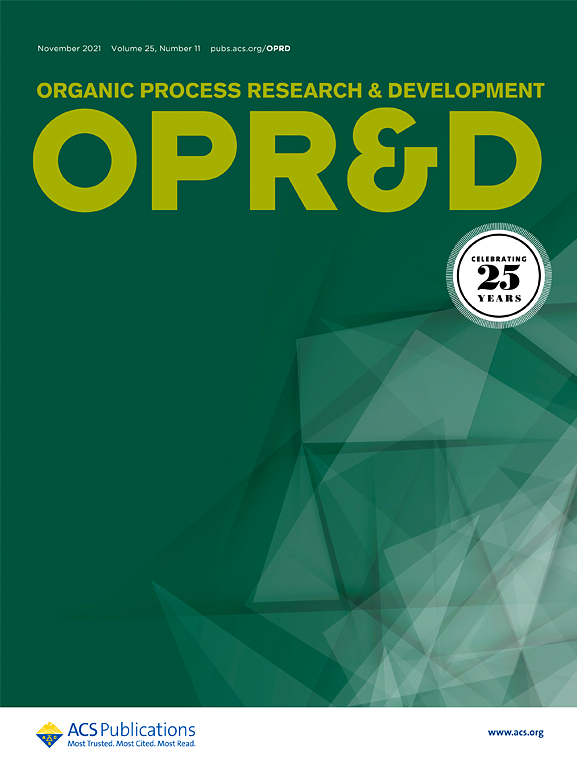实施生物分子生产的高效技术转让:连续模式工艺案例研究
IF 3.5
3区 化学
Q2 CHEMISTRY, APPLIED
引用次数: 0
摘要
自 1982 年以来,生物制药生产的格局发生了重大变化,从扩大工艺规模转变为注重质量设计,以确保产品质量和一致性。技术转让(TT)是这一演变的关键环节,它是一个复杂的、多方面的过程,是快速生产和销售救命药物不可或缺的一部分。本手稿介绍了一种新方法来克服技术转让中的一个关键挑战:在不同地点复制生产条件。我们的研究小组开发了一种手提箱大小的便携式流动微反应器(FMR),其优化设计包括基于流量与压力或粘度测量的反馈机制。这一创新大大简化了生产条件的复制,从而缩短了 TT 的持续时间并降低了其复杂性。我们在一个案例研究中详细介绍了这一策略的成功应用:使用便携式 FMR 将白细胞介素-6 重折叠工艺从日本的一个生产基地转移到美国。本文不仅讨论了便携式快速成型器的技术进步,还探讨了它对生物制药行业未来技术转让的影响,强调了它在时间和准确性至关重要的行业中提高效率和简化操作的潜力。本文章由计算机程序翻译,如有差异,请以英文原文为准。

Implementing an Efficient Technology Transfer for Biomolecule Production: A Case Study on Continuous-Mode Processes
The landscape of biopharmaceutical manufacturing has evolved significantly since 1982, moving from scaling up processes to focusing on quality by design initiatives for ensuring product quality and consistency. A pivotal aspect of this evolution is the technology transfer (TT), a complex, multifaceted process integral to the rapid production and distribution of life-saving drugs. This manuscript presents a novel approach to overcoming one of the key challenges in TT: replicating manufacturing conditions across different sites. Our research group has developed a suitcase-sized portable flow microreactor (FMR), whose optimized design includes a feedback mechanism based on flow versus pressure or viscosity measurements. This innovation significantly simplifies the replication of manufacturing conditions, thereby reducing the duration and complexity of TT. We detail the successful application of this strategy in a case study where interleukin-6 refolding processes were transferred from a site in Japan to the United States using the portable FMR. This paper not only discusses the technological advancements of the portable FMR but also explores its implications for future technology transfers in the biopharmaceutical industry, emphasizing its potential to enhance efficiency and streamline operations in a sector where time and accuracy are paramount.
求助全文
通过发布文献求助,成功后即可免费获取论文全文。
去求助
来源期刊
CiteScore
6.90
自引率
14.70%
发文量
251
审稿时长
2 months
期刊介绍:
The journal Organic Process Research & Development serves as a communication tool between industrial chemists and chemists working in universities and research institutes. As such, it reports original work from the broad field of industrial process chemistry but also presents academic results that are relevant, or potentially relevant, to industrial applications. Process chemistry is the science that enables the safe, environmentally benign and ultimately economical manufacturing of organic compounds that are required in larger amounts to help address the needs of society. Consequently, the Journal encompasses every aspect of organic chemistry, including all aspects of catalysis, synthetic methodology development and synthetic strategy exploration, but also includes aspects from analytical and solid-state chemistry and chemical engineering, such as work-up tools,process safety, or flow-chemistry. The goal of development and optimization of chemical reactions and processes is their transfer to a larger scale; original work describing such studies and the actual implementation on scale is highly relevant to the journal. However, studies on new developments from either industry, research institutes or academia that have not yet been demonstrated on scale, but where an industrial utility can be expected and where the study has addressed important prerequisites for a scale-up and has given confidence into the reliability and practicality of the chemistry, also serve the mission of OPR&D as a communication tool between the different contributors to the field.

 求助内容:
求助内容: 应助结果提醒方式:
应助结果提醒方式:


